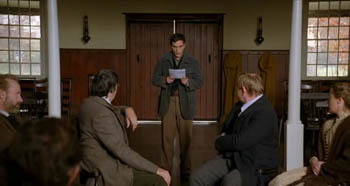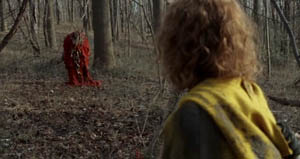|
This is where, if the majority of critics are to be believed, previously lauded director M. Night Shyamalan started to to slip. They're wrong; he started slipping with Signs, a films about some amazingly stupid aliens attacking some amazingly stupid and credulous humans. With The Village, he manages to hoist himself up again to a moderate degree. It's not a great film, but it's not a bad film. It's lurking somewhere in that vast grey area in between, somewhat lost and blundering around like its blind protagonist. 
In a nineteenth-century village, death has come suddenly and regrettably to a young boy. The taciturn Lucius, played by Joaquin Phoenix, petitions the village elders for permission to venture out to a larger town in search of medicine, to guard against future needless deaths. Despite these good intentions, however, neither he nor anyone else is allowed to leave the village; the surrounding forest is inhabited by mysterious creatures who will allow no passage, and to attempt it would be to invite retribution. The villagers themselves tend to get on with their lives quite pleasantly for the most part, eating and farming and making children, one hopes at a rate that will not cause their population to outswell the boundaries of their tiny safe zone. Within this island of bucolic bliss, we meet Ivy (Bryce Dallas Howard), second daughter of the town's patriarch, Edward Walker, who, having just seen (metaphorically speaking) her older sister joined in marriage, hopes for her own turn to come quickly. As she is apparently blind and her intended, Lucius, barely speaks, one might have cause to wonder just how much she could really know about him, but apparently Ivy can see auras-yet another instance of Shyamalan's fascination with '70s-era pseudoscience-which seem to speak to her of other people's intentions and feelings. There's also a village idiot who has a crush on Ivy, to a degree that seems to have unfortunately escaped her notice. For a time-a time which is a tad too long-it seems as though the plot is declining to actually show up and disturb anyone out of their routines, but eventually Lucius' curiosity about the forest causes a warning incursion by the creatures, and another less anticipated event at the same time virtually necessitates that the boundaries be breached nonetheless, and medical supplies procured. For reasons that don't make much sense to anyone else, Walker decides to allow Ivy to make the trip, and with a pair of escorts who quickly turn back and abandon the seemingly helpless girl in a most cowardly fashion, she eventually heads out into the forest. Like most of Shyamalan's other films, The Village is shot quite beautifully, and directorially employs a nice "show, don't tell" approach to plot exposition. Also like his other films, it struggles with the encumbrance of trying to take an hour's worth of story and forcing it to fill a two-hour running time. The story is all about the practice of non-disclosure, so that there is precious little going on in the portion of the film leading up to when the secrets finally start coming out, and we get the sense that there is actually a plot going on here after all. Previously, there's only the oft-repeated claim, voiced by many of the older villagers, that the towns beyond the forest are places of terribly ill repute that one should not want to visit in the first place, woodsy monsters notwithstanding. Why is the world outside a place of such dire consequence? The question rumbles like thunder behind nearly the entirety of the first two acts. Unfortunately, while the twist ending is nowhere near as banal as the mind-blowingly stupid excuse for a revelation that came at the end of Signs, it's not enough to feel up to the task it must perform. There are two key revelations ultimately made, and neither feels particularly stunning in import. At the same time, removing either twist would make the story development practically nonexistent. The director is spending too much of his effort in setting up his endings, and not enough time developing a compelling beginning. Things happen, when they finally do, because they have to in order to set up the payoff, whether they feel appropriate or not. While his eye remains well-focused, Shyamalan falters on other fronts. The matter of Ivy's supposed blindness is outright confusing, as Bryce Dallas Howard frequently acts as a sighted person would, including an early scene in which she playfully dashes full-tilt through a field in a way that would get an actual blind person killed. The first of the twists is revealed at exactly the wrong place and deflates most of the tension in the subsequent scene, and really, there's no good reason to have the creatures perpetually referred to as "those we do not speak of," since the villagers speak of them quite frequently, in the semantic guise of claiming that they don't. 
In other areas-some admittedly being less attributable to the filmmaker-the film holds up well. Howard has actual charm, and makes Ivy likeable and believably strong-Night would go on to criminally waste her talent with Lady in the Water. The performances as a whole rise to the occasion, and despite what could have been a natural tendency to portray the villagers as the borderline cultish loonies they very nearly are, they're instead played as quite decent people who don't go strutting around wagging their fingers and pontificating about sin and vice with every breath; it's something of a pity that, during the rather glacial first act, we learn so little about them beyond their mysterious phobia. Secrets permeate the titular village, and unlike the ode to self-delusion that Signs left us holding, this film leaves us to wonder on our own whether or not the secrets and the concomitant behavior were justified. Is manipulating people for their own good, even if it does actually result in their own good, still immoral? The film lets us choose, without an obvious, black-and white decision handed down to us. It's a good choice, and ultimately I have to place The Village in amongst his better films, if not at the top of that small heap. And for the record, I don't believe for a minute that Shyamalan was trying to make some sort of allegory about 9/11 here; the transposition of such meaning onto this Twilight Zone-ish piece says more about the many reviewers making such a comparison, and their own views on fear-mongering and authority, than it does about this film, which, despite coming a few short years after the unofficial Only Event in Human History that 9/11 has become, is addressing matters of guilt, paranoia and desperation that have been with us since the dawn of civilization. But really, the man needs to learn that there's more to a movie than its last five minutes, and start giving us a little more before that point comes around. I don't mind the slow speed, only the needling feeling that M. Night is just killing time until he can jump out and yell "surprise!" at us once again; it only makes the supposed twists increasingly transparent. -review by Matt Murray
|
|
||||||||